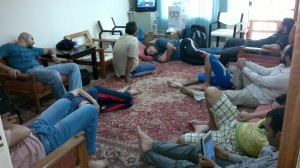By Tom Westcott.

London, 24 October 2012:
Two students among 35 occupying part of the Libyan Embassy in Kuala Lumpur, Malaysia have been . . .[restrict]hospitalised, one from the effects of a hunger strike.
The student had been one of three on hunger strike for a week as part of the 15-day protest against unexpected grant cuts by the Ministry of Higher Education.
Ali L. Elgayar, president of the group ‘Libyan Students in Malaysia,’ told Libya Herald from inside the embassy that, after a seven-day hunger strike, the student experienced heart problems and was taken to hospital. He has been in hospital for three days and his condition is now understood to be stable.
Another student, forced to sleep outside because of limited space indoors, has been hospitalised after contracting dengue from a mosquito bite. His condition is also understood to be stable. The embassy room occupied by the students is only big enough for 10 people, so many students are sleeping outside.
Two further protestors on hunger strike have consumed only water and juice for 11 days.
“I have asked them to stop the hunger strike,” said Elgayer, “but they refuse to listen. We are watching them very carefully and will send them to hospital immediately if they become ill.”
The police have tried to evict the students, reportedly under orders of the Libyan Ambassador in Malaysia, Abubakr al-Mansouri.
Elgayar said: “The Ambassador gave orders to the police to go into the embassy. He wanted the police to pull us out in any way, even using force.”
Another student, Ahmed, confirmed this, saying that although there has been a police presence since the beginning of the protest, they only became officially involved at the end of last week.
“The Malaysian police were ready to use force,” he said, “this was on the Ambassador’s order by official letter, which the police showed to the students.”
Elgayar said, however, that the students sat on the ground inside the embassy and told police: ‘If you need us out you will have to pull us out, we will not go easily.” According to Elgayar, embassy staff intervened, saying: “No, we cannot watch this, we cannot watch the Libyan guys being pulled out from inside the embassy,” and the Police retreated to their position outside.
The ambassador has reportedly now gone to Mecca on Haj.
“He knows about the hunger strike but the Ambassador doesn’t care,” Elgayar said, “he only needs the embassy to work right and he doesn’t care about the students, the scholarships or their problems.”
The students have received no response from the Ministry. “We have a response only from the Libyan Congress,” Elgayer said, “and they had a meeting on Monday with the Ministry of Higher Education. But they refused the request from the students, they refused even to listen to the legislators.” He added: “I think the congress guys will come to Malaysia after Eid.”
He said the students had encountered a sympathetic response from the police and the Malaysian foreign ministry, who have arranged to meet the students today. “Everybody understands our situation except the Ambassador and the Libyan government,” Elgayar said, “and this is what make us feel very bad.”
The students in Malaysia have been protesting since 9 October about cuts to their grants. There were originally some 70 protestors, but numbers fell when police refused to allow students to reenter the embassy after leaving to buy supplies.
Elgayar explained: “We complained about this to the police chief and we asked him to allow some students to go out to bring food otherwise we will die inside, so they arranged that three students are allowed to go out, just to bring in food.”
Some 1,500 Libyan students studying abroad have been affected by the grant cuts. It is reported that in Australia, a similar protest led to the reinstatement of their full grants.
[/restrict]






